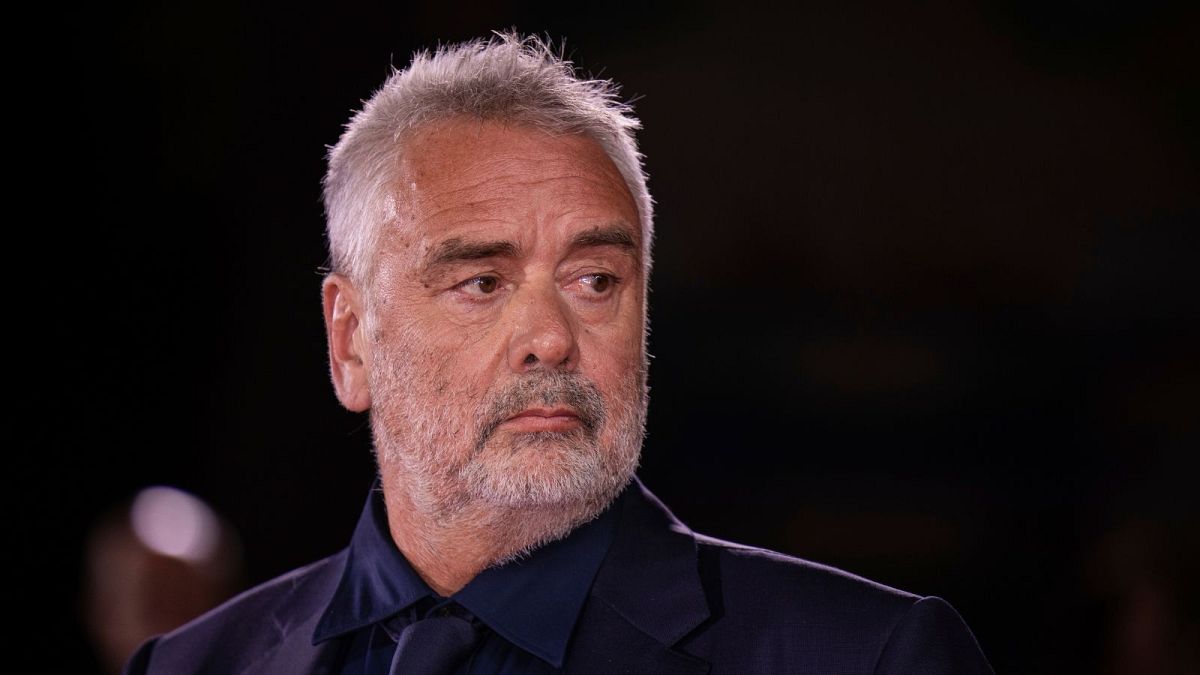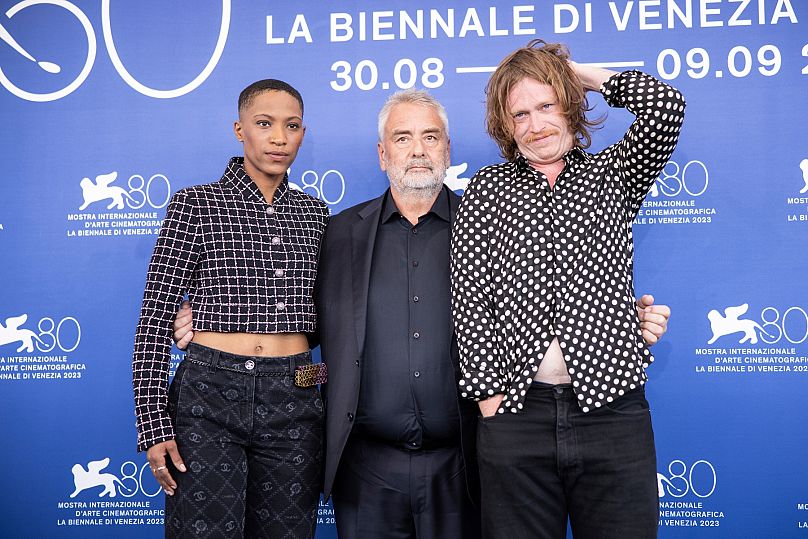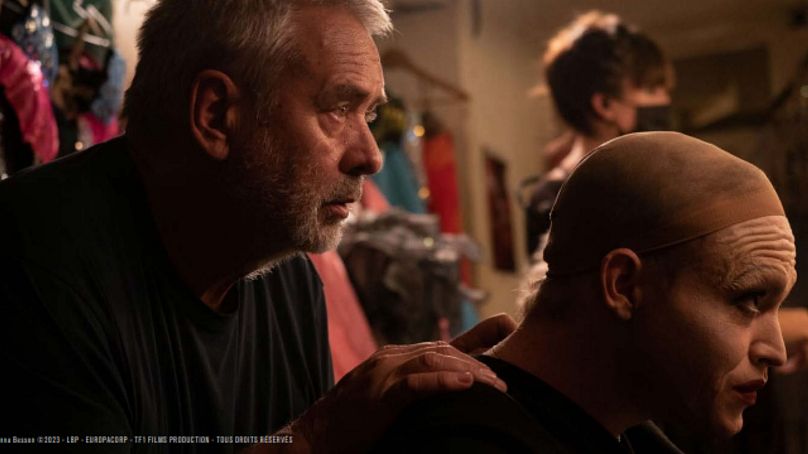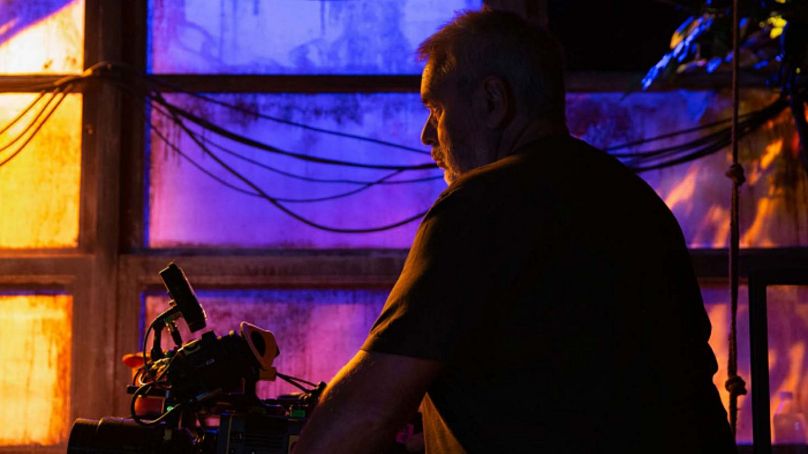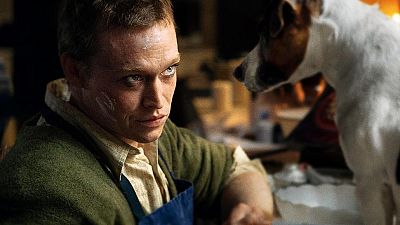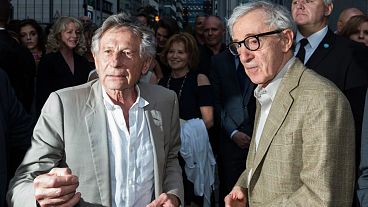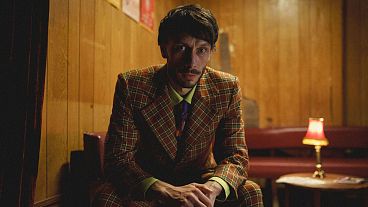The director of 'Léon: The Professional' and 'The Fifth Element' speaks to Euronews Culture in an exclusive one-on-one about his new film 'Dogman', and whether or not he fears that the conversations surrounding allegations of rape previously levelled against him will impact the film.
French director Luc Besson is back with Dogman, a dark thriller that is a film of firsts for the director behind classics like Le Grand Bleu, Nikita, Léon: The Professional and The Fifth Element.
It marks Besson’s first film bowing in Competition in a major festival, having premiered at this year’s Venice Film Festival. It is also his first after his career was derailed by rape allegations levelled against him in 2018. The ensuing legal battle consumed five years of his life.
Still, after being cleared of all charges by the Cour de Cassation, the French equivalent to the US’ Supreme Court, Besson’s off-screen concerns have dominated much of the headlines.
But he's here to talk about his new feature.
Dogman sees Caleb Landry Jones star as Douglas, a man who was abused as a child by his violent father, and who turns to dogs for friendship. As an adult, partly paralysed by the abuse he endured, he tries to do some good and finds solace in a drag cabaret troupe. Still, his deeds as an avenging angel who can instruct pooches to do his bidding attracts the wrong kind of attention...
I was lukewarm (or should that be Luc-warm?) on the film after its Venice premiere, and while I stick by my words, Dogman works as a knowingly trashy, character-driven movie boasting a darker edge than his recent work. It is powered by a towering performance by Landry Jones, who after Three Billboards Outside Ebbing, Missouri and Nitram continues to show he’s one of the most magnetic character actors currently working. There’s also the sneaking suspicion that if Dogman had been released before Todd Phillips' very overrated Joker (with which it shares some DNA), the film would have hit harder.
I sat down with Luc Besson in his hotel in Lyon, the morning after the French premiere, to talk about the film, working with dogs, his career, the threat of artificial intelligence, and whether or not he fears that persistent conversations will impact Dogman ’s reception.
Euronews Culture: Dogman has been described as your “comeback” film – how do you feel about that descriptive, considering your last film was in 2019 (Anna), which isn’t that long ago?
Luc Besson: It doesn’t bother me. I don’t pay much attention to that. I think that this film inscribes itself in the line of certain films that I’ve done in the past, so I think that for many people, Dogman represents a return to those days. We’re closer to Léon, not Jeanne d’Arc or Lucy. The ‘comeback’ descriptive is more about a return to the tone of Subway, Nikita, Léon ...
The adage says that you should never work with children or animals. You’ve done both, and with Dogman, as the title suggests, there are a lot of dogs... Was the shoot difficult with that impressive canine presence?
I don’t know who said that phrase, but it would seem they’re lazy! (Laughs) It’s not because things are difficult that you shouldn’t do them!
I think it was W.C. Fields.
Good for him. But the most difficult thing is to work with rubbish actors. It’s harder to work with bad actors than with good dogs. (Laughs) No, but seriously, it’s not the same type of work. The dogs are free, and so are children.
I remember working with Natalie Portman on Léon. She was 11 years old on set, and what I hadn’t anticipated was that after 30 minutes of shooting, she would say: “Right, we’re stopping.” We’re stopping? A shoot is 9 hours! She would say that she wanted to play. So, we bought bord games, and we would stop every 40 minutes or so in order to play. Because you needed to...
And in a way, dogs are the same. With dogs, you have to organise this permanent chaos – because 115 dogs is a lot! But it’s an organisation to create these little miracles. You know it’s going to be a longer shoot, with 23 dog trainers all shouting at the same time...
That must have been exhausting!
Yeah, on the first week, my producer told me after two days: “Luc, we’re never going to manage this – we're going to be three weeks delayed with all of this chaos!” But having previously filmed with dolphins and octopuses, I told her: “Wait a bit before panicking”, and after a few days, you get used to it and settle into the rhythm of things...
Speaking of actors, you were blessed with Caleb Landry Jones for the role of Douglas, who delivers the goods here. And when he was at the press conference in Venice, he was speaking with a Scottish accent, as he was taking time off a shoot. Is he as intense in person as he is on set?
I was so lucky to have met Caleb, because this film is not doable without an exceptional actor. But he’s adorable and incredibly kind. He’s a little ant – and what I mean by that is that he works a lot and that can give off the impression that he’s nuts or overly intense – but in reality, not at all.
As you said, in Venice, he took time off a shoot which takes place in the 15th century in Scotland, I believe, and he didn’t want to leave his character behind too much. On Dogman, Caleb spent five months in a wheelchair. He came from the US with the wheelchair – at the hotel in the evenings, he would be in his wheelchair and would often walk with this strange gait. People would ask themselves what illness he had. It’s his way of being in there, of committing. He doesn’t want to break character too much. He doesn’t clock off at 7pm every evening to go party. I think he’s scared of losing the character and tries to stay with him as long as possible. He’s an intense actor, and a wonderful one.
One aspect of the film that I appreciated was the soundtrack. You’re once again working with composer Eric Serra, who you’ve worked with on Nikita, Léon, The Fifth Element. What makes this partnership still work after all these years?
Music is the second dialogue. And when two dialoguists work with each other enough... It’s quite common in cinema. Sergio Leone and Ennio Morricone... It’s not easy to explain the bond there. When I’m in the studio to go see him, we speak about the themes, and I often add placeholder songs to show where I need the musical dialogue.
So, for instance, in the first scene, when the psychologist states her profession and Douglas hears this, he turns. He doesn’t say anything, but the music is there to say what isn’t spoken - “So, you’re a psychiatrist – let's see how you deal with me!” No dialogue, but there’s a musical crescendo that conveys he’s offering himself to her and saying: “What do you make of this?”
Eric complements the spoken dialogue to refine certain aspects. And now, after so many years, I do one out of two films with Eric. Not all of them, because when you know someone too well, it’s like an old couple – you need to spice things up in the couple! (Laughs) Sometimes, he’s angry at me because I hire another composer, but I do that on purpose so that he’s angry a bit and so that for the next film, he’ll be even better!
There’s also the choice of songs, with some Edith Piaf, Django Reinhardt, Eurythmics, Miles Davis, Marlene Dietrich... It’s an eclectic mix.
Well, the character of Douglas is suffering, and when he’s finally hired as a performer in the cabaret, where he can play at being someone else, he is forced to find “static” interpreters – because he can’t move. From then, I thought about static performers – Edith Piaf is static, and the scenario forced me to find specific artists. And it worked, as Piaf has such a wide emotional repetoir. And on top of it, Piaf is the memory of Douglas’ mother, who used to play him old European songs as a child. Hence, Piaf, Charles Trenet, Django Reinhardt – and the choice of these artists participates in not giving the film a certain timeframe. That was important to me. Even the costumes are very vintage, so you don’t know if we’re in the 80s, in the 00s or in the 2020s... I wanted a timeless quality to it. I’m always careful about these things, because certain aspects can make your film age slower.
As for Eurythmics, I was listening to it in the car, and when a director is preparing a film or shooting, he or she is completely in their bubble, spending about 23 hours of the day thinking about the film. And when Eurythmics was on the radio, with the lyrics “Some of them want to abuse you / Some of them want to be abused” - that’s the film in a nutshell.
I was in Venice where the film premiered, and a lot of the conversation around the film's selection in Competition centred on the accusations levelled against you. You’ve been found innocent of these allegations, and yet it seemed to taint the release of the film for many...
People do what they want to do. The justice system might not be perfect, but it’s irreplaceable. And there’s only one, and you have to bend to it. Justice went around five times – the investigation, the appeal, the quashing of the verdict... And if someone doesn’t want to respect justice and its verdict, that’s up to them. But media justice and popular justice are not justice.
Do you think that these conversations will hurt the film?
What I think is that the cause is a just and right one. Of course it is. But every cause needs to defend itself with dignity. You can’t defend a cause with lies – that's not possible. A cause needs to just and impartial, otherwise it loses its meaning. But, and I say this with kindness, I’m here to talk about the film and I do get fed up after a while being asked about this – the quashing of the verdict was six months ago already.
Fair enough. Getting back to film, Dogman is your 20th feature and you’ve tackled various genres over the years – action, animation, sci-fi. Are there any genres you haven’t tried yet that you’d want to?
No, because I don’t function in relation to genre. I’m more about emotional impulses of situations and characters. All of a sudden, I'll tell myself: I want to do this. I don’t think “Oh, I’ve done this genre of movie before so I shouldn’t do it.” Genre is secondary for me – what's important is the emotional call of a character. Because after watching a film, that’s what remains – this emotional impact that the character has left on you. You remember the character of Léon – this big tall thing that’s slightly stupid, who can’t read or write, but who kills. But “no women, no children.” Forest Gump, for example, leaves an emotional imprint. You don’t necessarily remember the film, but you remember the imprint.
I do know that I’d never do a Western, for example, to answer your question. And there are some genres, like musical comedy, that don’t really speak to me. A musical Western would be right out! (Laughs)
I’ve always appreciated The Fifth Element, for example, and I remember going to see it when it came out. Is the call of sci-fi one you’d answer again?
Definitely. How old were you when you saw it?
12 years old.
I wish I could have seen The Fifth Element when I was 12! (Laughs) That touches me a lot, imagining you as a kid watching that film. And now you're watching Dogman many years later as a critic. But you know, if I showed you The Fifth Element now, you’d probably just think: “Cute”.
I don't know about that. I’ve watched it a lot over the years...
Sure, but you’re coming at it with your memories of the film too... And when I watched it again with my kids when they were about 12, I was just looking at them. It was so brilliant to see them forget everything around them.
But to get back to your question, yes, I’d love to do another science fiction film. The only snag with sci-fi is that it’s expensive. So that complicates things. But I’d love to make another one. There are two or three that I’d love to make – sci-fi is the summit of the possible. You can reinvent everything. For The Fifth Element, I wrote about 400 pages on how that society functioned during that time – everything from how food works, the cutlery... Everything. It’s like when I did Jeanne d’Arc, I studied the 15th century. So for The Fifth Element, I had to write the world of the 25th century. And it’s great to be able to write history – and that fascinates me.
Speaking of writing, a dominating topic over the last few months has been the writers and actors strikes in Hollywood. The writers strike is now freshly over, even if the actors strike isn’t. Having worked in both Hollywood and Europe, do you think that the same thing could happen in France - or in Europe?
We’re quite well off in France in terms of protection. The US is a business that’s 30 times superior compared to ours, so it’s normal that there are all these problems. French cinema, for example, remains at a more human scale, so people know each other, speak quicker with each other... So, I do think we’re safer in France, and there is a lot of help and financial assistance for cinema – we're not in danger in that respect. However, we’re always faced with creation and quality. If the public abandons you, it’s up to us to propose better things.
One of the key demands in the strikes is creative protection against the use of artificial intelligence. I even saw that the Göteborg Festival will screen an AI-altered version of Ingmar Bergman’s Persona, with Liv Ullmann’s character digitally replaced by Alma Pöysti. It’s a headline grabber at the moment – what can be done with artificial intelligence, with regards to music, job replacement... Do you think that cinema is threatened in any way by AI advances?
Well, it’s been 50 years that, little by little, in various professions, humans have been replaced by machines. And human beings are the last thing that cannot be controlled. Because they are human. We complain, we’re happy, we cry... And the decision makers, those holding the purse strings, that bothers them. It bothers them that we can’t be controlled, so they try to replace us. But it’s up to us to not accept the situation passively and get pushed around.
But when you look at something like ChatGPT – that's only the resumé of information that already exists. It’s the Reader’s Digest of what’s already been. As of tomorrow, could ChatGPT invent Dogman? I doubt it. However, from what I read, it is being used in journalism more and more, so journalists should be worried!
Oh, we are!
I’ll share this with you. The writer Mark Kamen, who wrote Taken with me, tried it. He asked ChatGPT to come up with an action film with Liam Neeson, and it essentially dished out the first 30 pages and mildly rewrote Taken. It didn’t exactly overexert itself! (Laughs)
Lastly, after 40+ years in film, is there a project that you hold dear the most, or a film that never got made that you regret?
You make films at different ages. People often forget that... For Subway, I was 22 years old. The Fifth Element was at 30. It’s all linked to a time period, and they’re all like houses. You move out, and you’re left with memories of houses. I love them all.
Of course, I have tenderness and great fondness for the last one, because he’s the newbie and he’s still a child. You need to pamper him... “Oh, doesn’t he look like his father?” That kind of thing. Plus, Dogman has a disarming honesty, in my opinion. We’ve all suffered in our lives - with varying degrees, of course. And we have here a character who retrieves the pain of those around him. I’ve suffered in my life – like, a 5 out of 10 – Douglas is at a 10. But with enough empathy, you recognise that suffering in the character. You’re in immediate empathy with him, and the film asks how you get out of that suffering. Douglas attempts to get out of his pain in a positive way – he's disarming. In that sense, the film has an honesty to it. It's not a trick.
But sincerely, I love all my films for different reasons, for those different time periods and emotions. And when it comes to regrets, not really... I have regrets for the audience, because there are films I’ve got in my head – and they’re really good – and they’re not out yet. And I think: “Oh, that’s a shame because it’s really damn good!” (Laughs) But I’ve seen them. So, it’s not regret, really – it's still the desire to share.
The interview was translated from French.
Dogman premiered at this year's Venice Film Festival and is out in French cinemas now. The film's theatrical rollout continues in October (Netherlands, Israel, Germany, Hungary, Russia) and November-December (Spain, Estonia, Turkey).
